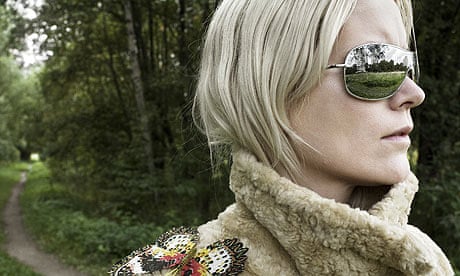Dance music is chockablock with anonymous artists, but few have concealed themselves with quite the dedication of the Knife. The Swedish sibling duo of Olof Dreijer and Karin Dreijer Andersson shun most interviews, never star in their own videos, rarely make public appearances and only recently revoked their steadfast refusal to play live, performing behind a screen, in the dark, wearing masks. They accepted the seven Swedish Grammys they won in 2007 via a series of unsettling videos, in which their faces and voices were grotesquely distorted and all the great guys who worked so hard at their record label went without thanks. "A friend of mine told me I'm pathetic, but I don't feel pathetic, I just feel weak," said one. "The thoughts are flying around in my head," said another. "Desperate thoughts."
So it's slightly surprising that Dreijer Andersson has released a solo album, albeit one even more opaque, creepy and forbidding than Silent Shout, the Knife album that won all those awards. Pseudonymous Fever Ray may be, but by definition, a solo album focuses attention on the person who made it, and avoiding personal attention previously seemed to be very much Dreijer Andersson's thing. She has even given interviews to promote it.
Admittedly, these aren't going to win any awards for their searing insight into a hitherto impenetrable enigma - "my music is a lot of everything," she helpfully informed one journalist - but they did reveal that Fever Ray has its roots in sleep deprivation. That makes sense when you hear the album, which strips away the dance beats that grounded Silent Shout, leaving behind ominous clouds of electronics and a penchant for synthetically manipulating her vocals in a way that might be the flipside of R&B and pop's current obsession with chroming the human voice via Auto-Tune: instead of achieving a perfect metallic sheen, she uses technology to make herself sound older, huskier, wearier.
There's a similar originality in the way Dreijer Andersson captures the weirdness of small-hours wakefulness. I'm Not Done features an insistent stamping at the amphetamine pace of Northern Soul, but the actual beat proceeds at a crawl, and her voice is heavy and gloopy with effects, suggesting a mind racing atop an exhausted body. The lyrics fly by in a blur of disconnected images, in which childhood memories figure heavily, as does obsessive behaviour, and an attitude to domesticity that borders on the psychotic. "I'm very good with plants, when my friends were away, they let me keep the soil moist," she sings on When I Grow Up, in a voice that suggests anyone leaving her in charge of their greenery should be fully prepared to find her ripping the leaves off and eating the soil on their return.
The result doesn't resemble dance music so much as something from the weirder fringes of 80s pop. The dolorous chords and stately rhythms recall the Cure, circa Faith, the glacial pace makes you think of the Blue Nile. There are lots of the synthesised faux-ethnic sounds popular on Fairlight sampler-driven epics such as Peter Gabriel's fourth eponymous album or Kate Bush's The Dreaming: gamelan-like chimes, oriental motifs, talking-drum percussion. Anyone requiring evidence of Dreijer Andersson's unique talent is directed to Keep the Streets Empty For Me, on which she somehow manages to conjure up an eerie, becalmed atmosphere using synthesised pan pipes.
But it's not just the sound that invokes the lost hinterlands of 80s pop, it's Fever Ray's sense of daring and ambition. It's an album that makes the listener work; its melodic richness is slowly revealed, rather than immediate. Furthermore, Dreijer Andersson let slip that her inspirational sleeplessness was post-natal, which suddenly pushes Fever Ray into largely unexplored territory. Like domestic contentment, new parenthood sits badly with rock and pop music. It tends to be avoided as a topic, possibly because there's much empirical evidence that it brings out the mawkish and trite side of even the greatest artists: at the height of his genius, new fatherhood made Stevie Wonder burp out the wretched Isn't She Lovely? Certainly, it's hard to think of another artist who's nailed the weird package of awe and fear that comes as standard with a newborn baby quite as perfectly as Dreijer Andersson does here. "I live between concrete walls," she sings, her voice prematurely aged. "In my arms, she felt so warm."
The album ends with Coconut, which has a definite note of exultation, both in the tune and the lyrics. "Lay back with a fat cigar," she sings. It sounds a bit odd coming from a woman who's spent the last 45 minutes brilliantly evoking the claustrophobia and 3am isolation of maternity, but, still, you can understand it: as unlikely a step as Fever Ray may seem for one of electronic music's most enigmatic figures, the results are triumphant.
